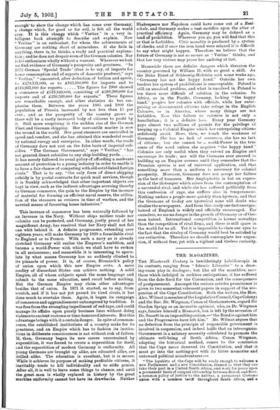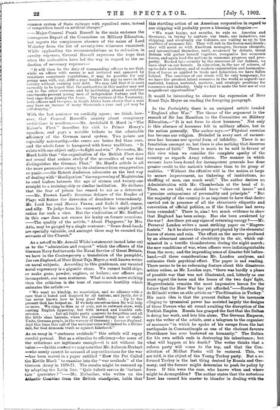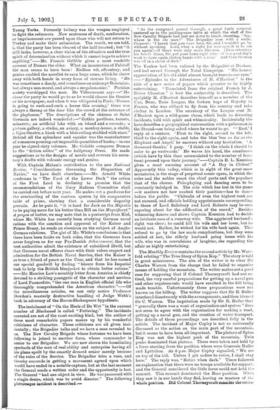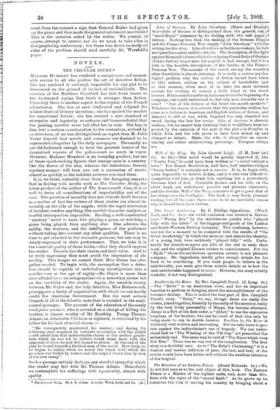THE MAGAZINES.
THE Nineteenth Century is bewilderingly kaleidoscopic in its contents, ranging from "Islamic Libraries" to a draw- ing-room play in duologue; but like all the monthlies, save those which indulged in reckless anticipations, it has suffered from the date fixed for the Coronation, and the consequences of postponement. Amongst the serious articles prominence is given to two somewhat vehement papers in support of the sus- pension of the Cape Constitution Both the writers, the Hon. Alex. Wilmot (a member of the Legislative Council, Cape Colony) and the Rev. Dr. Wirgman, Canon of Grahamstown, regard Sir Gordon Sprigg as an incurable optimist, who, as Dr. Wirgman says, fancies himself a Bismarck, but is left by the secession of Dr. Smartt in an impossible position,—" the Bond is against him and the Progressives have left him." Mr. Wilmot argues that no defection from the principle of responsible government is involved in suspension, and indeed holds that an interregnum Government is a salutary necessity calculated to Promote the ultimate well-being of South Africa. Canon Wickman,
adopting the historical method, comes to the conclusion that the Cape never deserved its Constitution, and -that, it must go into the melting-pot with its bitter memories- and untoward political misadventures ;— " The loyalists of the Cape will be ready enough to welcome a new Parliament and a new Constitution, framed so that they can take their part in a United South Africa, and work for peace upon a permanent basis of coequal citizenship between Briton and Boer, a common policy of justice to the natives, a permanent Customs union with a common tariff throughout- South Africa; and a
common system of State railways with equalised rates, instead of competition based on artificial charges."
—Major-General Frank Russell in the main endorses the courageous Report of the Committee on Military Education, but regrets the conspicuous absence of the name of Lord Wolseley from the list of seventy-two witnesses examined. While applauding the recommendations as to red action in cavalry expenses, General Russell expresses the hope that when the authorities have led the way in regard to the re- duction of necessary expenses—
"It will then be the duty of commanding officers to see that, while an officer with means is not irritated and annoyed by vexatious sumptuary regulations, it may be possible for any young man with, say, ..£200 a year besides his pay to serve in the cavalry without running into debt. We may add that it is most earnestly to be hoped that the authorities in this matter may not run to the other extreme, and by instituting absurd restrictive enactments prevent young men of independent fortune and the best class from joining the Army. The services of the Yeomanry, both officers and troopers, in South Africa have shown that a man may have an income of many thousands a year and yet may be self-denying."
With the last sentence we cordially agree ; we think, how- ever, that General Russell's anxiety about sumptuary restrictions is needless.—Mr. Archibald S. Hurd in "The Kaiser's Fleet" describes his visit to Prince Henry's squadron, and pays a notable tribute to the admirable efficiency of the German naval system. Two points are especially noteworthy,—the crews are better fed than ours, and the whole force is hampered with fewer traditions. "It exists with one object only,—to fight and win." Per contra, Mr. Hurd holds that "the organisation of the British Fleet does not reveal that serious study of the necessities of war that distinguishes the German Fleet." Mr. Hurd's article is all the more persuasive owing to its abstinence from exaggeration or panic.—Sir Robert Anderson advocates as the best way of dealing with " Hooliganism " the empowering of Magistrates to send loafers between the age of sixteen and twenty-one straight to a training-ship or similar institution. He declares that the fear of prison has ceased to act as a deterrent. —Mr. Frewen Lord's ferocious defence of the Reader of
Plays will flutter the dovecotes of decadence tremendously. Mr. Lord has read Monne Vairna, and finds it dull, coarse, and silly. To judge from his summary, he has ample justifi- cation for such a view. But the vindication of Mr. Redford
in this case does not excuse his laxity on former occasions. —The quality of the article, "About Playgoers," by Mrs.
Aria, may be gauged by a single sentence : "Some dead-beads are specially valuable, and amongst these may be counted the servants of the Church."
As a set-off to Mr. Arnold White's statement (noted later on) as to the "admiration and respect" which the officers of the German Navy feel towards the Naval Service of Great Britain, we have in the Contemporary a translation of the pamphlet, Los von England, of Herr Ernst Teja Meyer, a well-known writer on naval subjects. According to this gentleman, our vaunted naval supremacy is a gigantic sham. We cannot build ships, or make guns, powder, engines, or boilers; our officers are incompetent, our men mutinous. What is much more striking than the criticism is the tone of rancorous hostility which animates the article :— " We want no kinship, no association, and no alliance with a race that is hated and despised by all nations, and justly, for it has never known how to keep good faith Up to the present God has helped us. If we help ourselves then He will help us more. We cling to Him as of yore, not in outward show, with canting English hypocrisy, but with inward and humble sub-
mission Let all futile party quarrels be forgotten and all the little class hatreds, when the greatest things are at stake. Unite, German people, in the war-cry of Germany : Los von England. And this time this call of the national voice will indeed be a Divine call, for God demands truth as against falsehood?'
As an essay in "unctuous rectitude" this article will repay careful perusal. But as a stimulus to efficiency—for some of the criticisms are legitimate enough—it is not without its value.—In this context we may note that Mr. Auberon Herbert —who surely cannot be accused of any enthusiasm for the war —has been moved in a paper entitled "How the Pot Called the Kettle Black" to examine into the "war methods" of the German Army in 1870-71. The results might be summed up by adapting the Latin line, " Quis tulerit saevos de barbari- tate ' querentes ? "—Mr. Elzbacher, who writes on the Ltlantk Combine from the British standpoint, bolds that this startling action of an American corporation in regard to our shipping will probably prove a blessing in disguise
We want brains, not mouths, to rule us. America and Germany, in trying to capture our trade, our industries, our shipping, and eventually our Colonies, are waking us up to the realities of economic life. They will rub in the lesson mercilessly; they will assist us with American managers, German chemists, and international financiers, until, awakened by defeats, Great Britain will gather herself together, reorganise her economic forces, and again lead the nations in economic progress and pros- perity. Rocked into security by the successes of our fathers, we have slept on our laurels. In education, in the use of science, of up-to-date machinery, and of modern organisation and harmonisa- tion of forces as applied to trade and industries, we have fallen behind. The successes of our rivals will be only temporary, for we have the greatest latent resources in the world as regards raw material, human material, markets, and strategic positions for commerce and industry. Only we fail to make the best use of our magnificent opportunities?'
It would be interesting to observe the expression of Herr Ernst Teja Meyer on reading the foregoing paragraph.
In the Fortnightly there is an unsigned article headed "England after War." The theme of the argument is the remark of Sir Ian Hamilton to the Committee on Military Education,—"It is not form to show keenness." Not only is this absence of keenness felt in military affairs, but in the nation generally. The author says :—" Physical exercise has become our religion. Disbelief in every sort of earnest- ness has become our special form of infidelity. There is no fanaticism amongst us, but there is also nothing that deserves the name of faith." There is much to be said in favour of this view when we consider the complete apathy of the country as regards Army reform. The manner in which excuses have been found for incompetent generals has done greater credit to the nation's tolerance than to its grasp of realities. "Without the effective will in the nation at large to secure improvement, no tinkering of institutions, no shuffling of men, can much avail." The author desires an Administration with Mr. Chamberlain at the head of it. Then, we are told, we should have "clear-cut issues" and "genuine antagonisms of personality and principle." "But the majority of the country is as impotent to have that desire carried out in presence of all the chinoiserie etiquette and convention of official politics, as if the franchise had never been extended." There is, alas ! too much evidence to show that England has been asleep. Has she been awakened by the war? Are there yet any signs of returning energy P—Mr. Perceval Landon writes a most striking paper on " lagers- fontein." In it he shows the great part played by the elemental forces of storm and rain. The effect on the nerves produced by an abnormal amount of electricity in the air, which cul- minated in a terrific thunderstorm during the night march; the new conditions of war, when officers were indistinguishable from the men; and the impending sense of disaster felt before- hand,—all these considerations Mr. Landon analyses, and estimates their psychical effect. The paper is sad reading. There seems to be no redeeming feature about this disastrous action unless, as Mr. Landon says, "there was hardly a phase of possible war that was not illustrated, and, bitterly as one must regret the issue and the losses of the two days' fight, Magersfontein remains the most impressive lesson for the future that the Boer War has yet afforded."—Rustem Bey de Bilinsk-i writes an able article on" The Situation in Turkey." His main idea is that the present Sultan by his insensate clinging to tyrannical power has assisted largely the designs of those Powers who sit round awaiting the disruption of the Turkish Empire. Russia has grasped the fact that the Sultan is doing her work, and lets him alone, The German Emperor, says the writer of the article, sent a telegram to the organiser of massacre "in which he spoke of his escape from the last earthquake in Constantinople as one of the choicest favours Providence has ever bestowed on humanity." The Sultan for his own selfish ends is destroying his inheritance; but what will happen at his death P The writer thinks that a reform party will come to the top, and that the Con- stitution of Midhat Pasha will be restored. This, we are told, is the object of the Young Turkey party. But a re- formed Turkey is the last thing desired by Russia and Ger- many, and the former might determine to push its policy by force. If this were the case, who knows when and where might be Armageddon P The author states that the notorious Izzet has caused his master to blunder in dealing with the
Young Turks. Formerly bribery was the weapon employed to fight the reformers. Now sentences of death, confiscation, or imprisonment are passed upon those who will not return to Turkey and make their submission. The result, we are told, is that the party has been cleared of the half-hearted; but "it still lacks, however, a clear vision of the situation and the true spirit of determination without which it cannot hope to achieve auything."—Mr. Francis Gribble gives a moat readable account of Dumas the elder. What an incarnation of Falstaff the man seems to have been ! Endless wit, effrontery, and genius enabled the novelist to earn huge sums, which he threw away with both hands in every form of riotous living. "He was sometimes a dandy, and sometimes an unkempt Bohemian, but always non-moral, and always a megalomaniac." Parisian society worshipped the man. De Villemessant says :—" He chose the party he would go to as he would choose his theatre or his newspaper; and when it was whispered in Paris, 'Dumas is going to such-and-such a house this evening,' there was always a throng at the door like the crowd at the entrance of the playhouse." The descriptions of the chateau at Saint Germain are indeed wonderful :—" Gothic pavilions, turrets, minarets; an artificial lake with an island and a cascade; a picture gallery, a studio, an aviary, a monkey-house, a stable, a, bijou theatre, a kiosk with a blue ceiling studded with stars." Behind all the splendour and squalor was the manufacturer of romances pouring out impossible quantities of books,—in one year he signed sixty volumes. Mr. Gribble compares Dumas to the "fiction editor" of the halfpenny Press. He made suggestions as to the designs of novels and rewrote his secre- tary's drafts with volcanic energy and genius.
With Captain Mahan's contribution to the new National Review, "Considerations Governing the Disposition of Navies," we have dealt elsewhere.—Mr. Arnold White condemns in "The Food of the Lower Deck" the action of the First Lord in declining to promise that the recommendations of the Navy Rations Committee shall be carried out before next year. He makes out a good case for the overhauling of the canteen system by his comparative table of prices, showing that a considerable disparity prevails. As he puts it, "it is hard for Jack on the Majestic to be paying more for his butter than Bill on the Magnificent." A propos of butter, we may note that in a postscript from Kiel, where Mr. White has recently been studying German naval rations with the sanction and approval of the Kaiser and Prince Henry, he sends an eirenicon on the subject of Anglo- German relations. The gist of Mr. White's conclusions is that there have been faults on both sides, that the Germans have never forgiven us for our Pro-Danish Schwiirwerei, that the best authorities admit the existence of subsidised illwill, but that German naval officers share with their rulers respect and admiration for the British Naval Service, that the Kaiser is as true a friend of peace as the Czar, and that lie has earned our special goodwill by finding "leisure from his Imperial task to help the British bluejacket to obtain better rations." —Mr. Maurice Low's monthly letter from America is chiefly devoted to a striking panegyric of the character and services of Lord Pauncefote, "the one man in English official life who thoroughly comprehended the American charactei."—Of the miscellaneous articles, we can only notice Professor Dowden's masterly destructive handling of Judge Webb's book in advocacy of the Bacon-Shakespeare hypothesis.
The instalment of "On the Heels of De Wet "in the current number of Blackwood is called "Pottering?' The incidents narrated are not of the most exciting kind, but the author of these most remarkable papers makes up by his wonderful criticisms of character. These criticisms are all given inci- dentally; the Brigadier talks and we have a man revealed to us. The New Cavalry Brigade whose fortunes we have been following is joined to another force, whose commander is senior to our Brigadier. We are now shown the humiliating spectacle of the man of real ability and enterprise having all his plans spoilt by the smartly dressed senior merely because of the rules of the Service. The Brigadier tries a ruse, and thereby succeeds in getting a movement agreed upon which would have ended in a notable capture, but at the last moment the General sends a written order and the opportunity is lost. The General "had one object in view. He was possessed with a single desire, which was to avoid disaster." The following picturesque incident is described
"As the rearguard passed through, a great burly corporal cantered up to the packing-case table at which the staff of the New Cavalry Brigade had just sat down to lunch, shouting, Say, where is the ole man ?' The Brigadier rose with a smile. Corporal : I heard that you were here, Sir, and I couldn't go by without speaking. Lord, what a sight for sore eyes it is to see you again!—if there were only more like you. (Then extending his hand) Come, Sir, put your hand right here—it is a good day's work to have again shaken hands with a man.' And then the man was off in a cloud of dust."
The Yankee had been enlisted by the Brigadier at Durban, and had served through the Natal Campaign. "His honest appreciation of his old chief almost brought tears to our eyes."
"Episodes in the Adventures of M. d'Haricot" is the title of a new series of papers which promise to be highly entertaining. "Translated from the original French by J. Storer Clouston " is how the authorship is described. The sprightly M. d'Haricot describes himself as a member of the Line, Deux, Trois League, the forlorn hope of Royalty in France, who was obliged to fly from his country and take shelter in London. The secretary of the League sent M.
d'Haricot upon a wild-goose chase, which leads to diverting incidents, told with spirit and whimsicality. Incidentally the hero describes a geographical conversation with a policeman in the Strand—on being asked where he wan& to go. "East,' I reply at a venture. First to the right, second to the left, third to the right again, and take the blue 'bus as far as the Elephant and Angel,' he answers without any hesitation. A thousand thanks,' I gasp. I think on the whole I should be safer to go westwards.' He waves his hand, the omnibuses (which have by this time accumulated to the number of four- teen) proceed upon their journey."—Captain R. L. Kennion gives a most amusing account of "A Day in Chitral." Apparently this valley, which is in sight of the great snow mountains, is the stage of perpetual comic opera, in which the ruler and the nobles enact the chief parts and the populace that of the chorus. Polo-playing and dancing seem to be constantly indulged in. The side which has lost in the game —it matters not how exalted their position—has to dance before the public. " Chitralis of even the highest rank are not excused, and officials holding appointments corresponding to those of Lord Salisbury and Lord Roberts may be seen capering about for the edification of the crowd." Besides witnessing dances and shows Captain Kennion had to decide an intricate case of a runaway wife. The aggrieved husband's right was clear; he could kill his wife and her lover, but Ile would not. Rather, he wished for his wife back again. This refusal to go by the law made complications, but they were settled at last, the elderly husband going home with his wife, who was in convulsions of laughter, she regarding the affair as highly entertaining.
The Monthly Review contains the second article by Mr. Worn- fold relating " The True Story of Spion Kop." The story is told in great minuteness. The aim of the writer is to clear Sir Charles Warren from the charge that he failed to organise means of holding the mountain. The writer makes out a good case for supposing that if Colonel Thorneycroft had not re- tired, the very careful preparations for getting up a naval gun and other requirements would have resulted in the hill being made tenable. Unfortunately these preparations were not known on the hilltop. The writer suggests that Sir R. Buller interfered disastrously with the arrangements, and then blamed Sir C. Warren. The imputation made by Sir R. Buller that "generally there was a want of organisation and system "does not seem to agree with the organisation for making a road, getting up a naval gun, and the creation of water transport. The details of these proceedings are described fully in the article. The incident of Major Copley is not so universally discussed as the action on the main part of the mountain, but it seems to have been all-important. The plateau of Spion Kop was not the highest peak of the mountain. Twin peaks dominated that plateau. These were taken and held by a force starting from the position where were Generals Buller and Lyttelton. At 6 p.m. Major Copley signalled, "We are on top of the hill. Unless I get orders to retire, I shall stay here." The reply was, "Retire when dark." There followed an explanation that there were no troops available for support. and the General considered the little force could not hold the summit. This summit dominated the Boer position. When they saw it in our hands they fled, leaving us masters of the whole position. Did Colonel Thorneyoroft consider the retire- .zuent from the summit a. sign that General Buller had given up the game, and thus made the general retirement inevitable ? This is the question asked by the writer. We kannot,- of course, attempt to answer, nor do we mean to take sides in this perplexing controversy; but those who desire to study all sides of the problem should read carefully Mr. Worsfold's paper.

















































 Previous page
Previous page